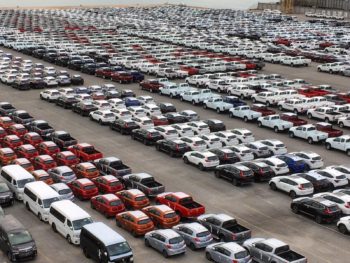Fleet market falls in weakest March for new car registrations since 1998
Fleet registrations slumped in March as the new car market hit its lowest level since 1998 on the back of the chip shortage.

The new car registration data reveals the weakest March since 1998, before the UK went to two annual number plate changes – as the supply chain shortages constrained deliveries
A total of 243,479 new cars were registered in March; down 14.3% year-on-year in what is normally the industry’s busiest month, according to the latest figures from the Society of Motor Manufacturers and Traders (SMMT).
The fleet sector fell 34.4% to 99,338 units as carmakers continued to prioritise sales to private consumers and smaller business. Private registrations were up 8.2% to 137,236 units, while ‘Business’ registrations to companies with fewer than 25 vehicles rose 20.0% to 6,905 units.
With the industry reporting strong order books, the SMMT said it was the constraints on supply preventing the auto sector from moving into full recovery. Alongside the global semiconductor shortage, longer-term uncertainty remains, with the invasion of Ukraine raising risk to supply chains. And economic headwinds such as rising energy costs, fuel costs, inflation and a squeeze on household incomes could impact new vehicle demand.
But growth in battery electric vehicles (BEVs) take-up continues to hit new records – a total of 39,315 BEVs left dealerships last month; up 78.7% on last year and taking a 16.1% market share. It’s the highest volume of BEV registrations ever recorded in a single month.
Significantly, more BEVs were registered in March 2022 than during the whole of 2019.
Plug-in hybrid (PHEV) registrations declined by 7.5% to 16,037 units, but hybrids (HEVs) grew 28.4% to 27,737 units.
As a result, electrified vehicles comprised more than a third (34.1%) of all new car registrations.
Across the whole new car market, year-to-date figures make for more sombre reading and show the sector was down 1.9% for the first three months of 2022, with fleet registrations falling 22.3%.
The SMMT said the performance was deeply disappointing and lays bare the challenges ahead, while chief executive Mike Hawes also urging fleets and drivers to make the most of the current Plug-in Car Grants available until end of March 2023.
He continued: “Placing orders now will be beneficial for those looking to take advantage of incentives and lower running costs for electric vehicles, especially as the Ukraine crisis could affect supply still further. With increasing household and business costs, government must do all it can to support consumers so that the growth of electric vehicles can be sustained and the UK’s ambitious net zero timetable delivered.”
Commenting on the registration data, Meryem Brassington, electrification propositions lead at Lex Autolease, said: “The latest figures from the SMMT show that the growth in EV take-up continues apace – now accounting for 16% of all new motors bought in the UK. The continued adoption is essential to provide a good supply of used EVs in the future to ensure the transition to electric is accessible for everyone.
“The Government’s plans for a tenfold increase in electric car charge points by the end of the decade will go a long way to removing charging infrastructure as a perceived and real barrier to adoption of EVs. Delivery on this is critical especially for those drivers and businesses in rural areas where access to charging remains a major barrier to electric vehicle uptake.”
Deloitte also commented on the Government’s EV Infrastructure Strategy, saying it had given EVs a jump start.
Jamie Hamilton, automotive director and head of electric vehicles, said: “The commitment of reaching 300,000 public charge points by 2030 will help alleviate anxiety amongst the one in three UK households who don’t have off-street parking, making access to EVs more equitable in the future.
“The strategy also makes a welcome commitment to working with commercial fleets. Even with a fall of 34.4% of fleet sales in March 2022, they still account for two-fifths of all new car sales in the UK. Supporting their electrification will be key to achieving 2030 targets. In order to avoid any shocks along the way, now is the time for private companies to begin considering their EV transition plans.”












